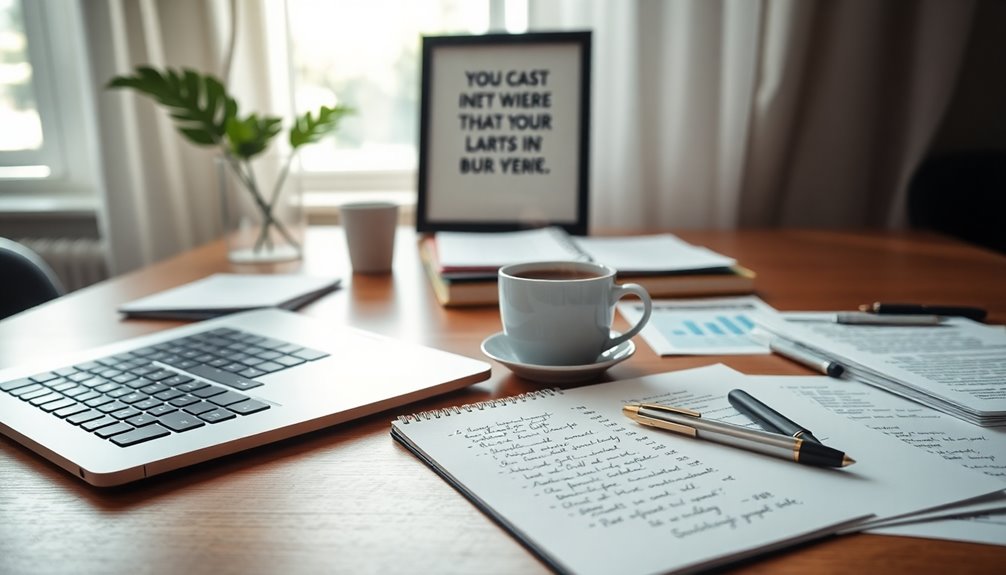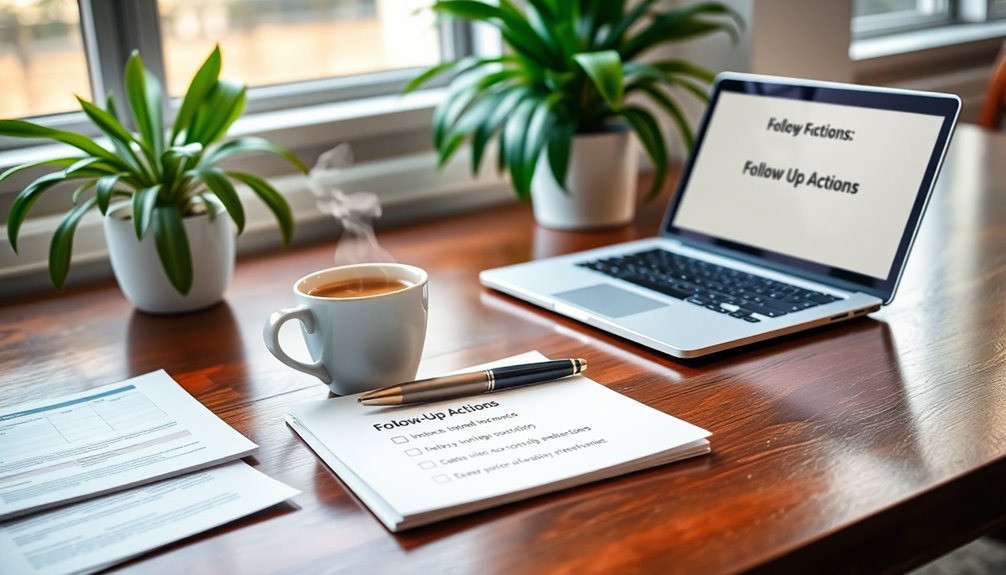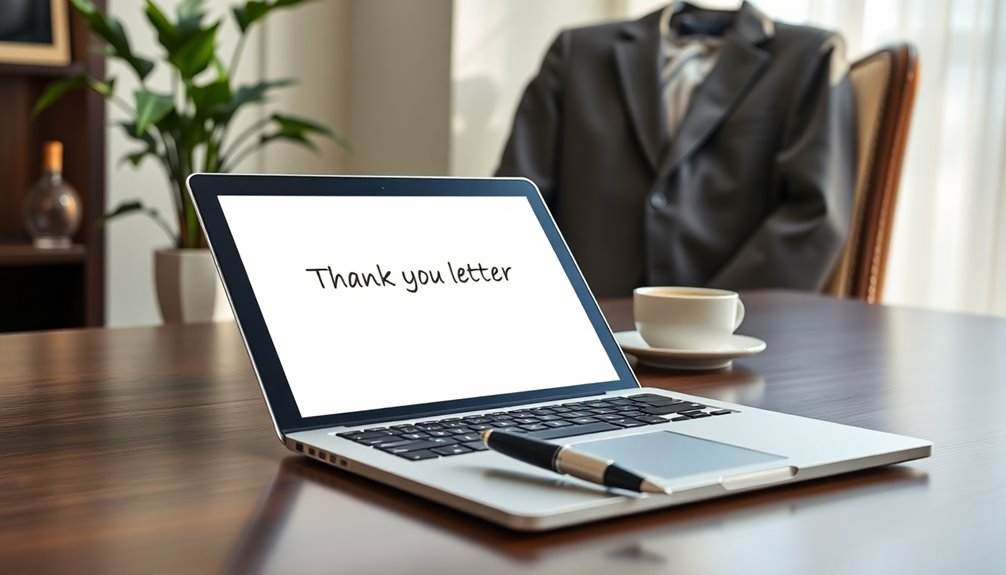Revealing the secrets of screening interviews starts with understanding their purpose. These interviews filter candidates based on qualifications and assess cultural fit. Expect questions about your skills, experiences, and aspirations, so prepare thoughtfully. Review the job description and research the company's values to tailor your answers. Practice active listening and maintain eye contact to show engagement. Authenticity is key, so reflect on your past experiences to enhance your responses. Don't forget to follow up with a thank-you note. You'll discover more tips and insights to elevate your interview game and boost your chances of success.
Key Takeaways
- Understand that screening interviews primarily assess qualifications, skills, and cultural fit within the company.
- Prepare for common questions about your experience, motivations, and salary expectations to enhance your confidence.
- Actively research the company's products, values, and market position to demonstrate your interest and alignment.
- Practice answering questions and engaging in mock interviews to improve your communication and delivery.
- Always follow up with a thank-you note to express appreciation and reinforce your interest in the position.
Understanding Screening Interviews

Screening interviews are like the first gatekeepers in the job selection process, helping employers sift through applicants to find the best fit for their teams.
These initial assessments aim to filter candidates by evaluating qualifications, skills, and relevant experience. Typically conducted by HR or recruiters, they focus on determining whether you'll mesh well with the company culture.
Screening interviews can take various forms, such as phone calls, video chats, or in-person meetings, allowing flexibility for both you and the interviewer.
This stage is essential, as it sets the tone for further interviews and can greatly influence your chances of moving forward in the hiring process. Understanding this helps you approach screening interviews with the right mindset.
Key Questions to Expect

As you prepare for your screening interview, it's important to anticipate the types of questions you might face.
These questions typically focus on your skills, experiences, and motivations. You should be ready to discuss your relevant work experience, career aspirations, and reasons for leaving previous positions.
Here are some key questions you may encounter:
- "What relevant experience do you bring to this role?"
- "Where do you see yourself in five years?"
- "What are your salary expectations?"
Additionally, demonstrating your understanding of personal finance management can set you apart as a candidate who is financially savvy and responsible.
Effective Preparation Strategies

Effective preparation for a screening interview can greatly increase your chances of success. Start by reviewing the job description to understand the qualifications and responsibilities required.
Research the company to familiarize yourself with its products, market position, and values, so you can answer questions like "What do you know about us?" confidently.
Know your resume inside and out; be ready to discuss your previous roles and accomplishments.
Practice interviewing with a friend to enhance your delivery and build confidence.
Finally, prepare insightful questions to ask the interviewer, showcasing your genuine interest in the role. Additionally, demonstrating strong communication skills can significantly enhance your rapport with the interviewer and reflect your potential as a leader.
Best Practices During Interviews

- Listen Actively: Pay attention to the interviewer's questions and respond thoughtfully. This shows that you value their time and input.
- Be Authentic: Share your experiences and personality genuinely, as this helps establish a connection and demonstrates cultural fit.
- Maintain Eye Contact: If it's a video or in-person interview, eye contact conveys confidence and helps build rapport.
- Reflect on Past Experiences: Drawing from your experiences can enhance your responses and demonstrate personal growth during the interview process.
Follow-Up Actions After Interviews

The key to making a lasting impression after an interview lies in your follow-up actions. Start by sending a thank-you note within 24 hours. Express appreciation for the opportunity and reiterate your interest in the position. This small gesture can set you apart from other candidates.
If the interviewer provided specific instructions for follow-up, be sure to follow them closely. Patience is essential—allow a week or two before you check in if you haven't heard back.
In the meantime, prepare for a potential second interview by researching more about the company. Document any insights or feedback from the interview to refine your approach. These actions show professionalism and enthusiasm, reinforcing your candidacy.
Common Mistakes to Avoid

Following up after interviews is important, but avoiding common mistakes can be just as essential to your success. Many candidates stumble on key areas that can jeopardize their chances.
Here are a few pitfalls you should steer clear of:
- Neglecting Research: Failing to understand the company's mission and values can make your answers seem uninformed.
- Lack of Preparation: Going in without practicing responses can lead to stumbling over questions and missing opportunities to showcase your skills.
- Ignoring Follow-Up Instructions: Not adhering to any specific follow-up guidelines can come across as careless and unprofessional.
Enhancing Your Interview Skills

Many candidates find that enhancing their interview skills can greatly improve their chances of success. Start by reviewing the job description and researching the company; this knowledge shows your commitment and helps you tailor your answers.
Know your resume inside out, so you can confidently discuss your accomplishments. Practice common interview questions with a friend to boost your confidence and refine your responses.
During the interview, maintain enthusiasm; a positive demeanor can leave a lasting impression. Remember to ask insightful questions that demonstrate your interest in the role and organization. Incorporating audience engagement strategies can further enhance your communication during interviews.
After the interview, sending a thank-you note within 24 hours can reinforce your enthusiasm and professionalism, keeping you top of mind for the interviewer.
Frequently Asked Questions
How Long Do Screening Interviews Typically Last?
Screening interviews typically last between 15 to 30 minutes. This timeframe allows you to present your qualifications and answer key questions without going into extensive detail.
You should use this time wisely by being concise and focused. Keep in mind that the interviewer is looking to gauge your fit for the role and the company culture, so make sure to convey your enthusiasm and relevant skills effectively during this brief interaction.
What Should I Wear for a Screening Interview?
For a screening interview, you should wear something professional yet comfortable.
Opt for business casual attire, like a nice blouse or shirt paired with slacks or a skirt. Make sure your clothes are clean and wrinkle-free.
If it's a video interview, dress appropriately from head to toe, just in case you need to stand up.
Can I Ask About Company Culture During the Screening?
Absolutely, you can ask about company culture during the screening. It shows your genuine interest in how well you might fit in.
You might say something like, "Can you describe the team dynamics or work environment?"
This not only helps you gauge if the company aligns with your values but also demonstrates that you're serious about finding the right fit for both you and the organization.
Don't hesitate to inquire!
Are Screening Interviews Usually Conducted by HR?
Yes, screening interviews are usually conducted by HR or recruiters. They assess your qualifications, skills, and cultural fit within the organization.
You'll often engage with someone who specializes in understanding both the role and the company's needs. They'll ask about your experience, career goals, and other relevant topics.
This initial connection is essential, so be prepared to showcase your best self and demonstrate why you'd be a great fit for the team.
What Technologies Are Commonly Used for Virtual Screenings?
For virtual screenings, you'll often use video conferencing tools like Zoom, Microsoft Teams, or Google Meet.
These platforms allow you to connect with interviewers from anywhere. Additionally, some companies might use specialized recruitment software that includes features for scheduling, recording interviews, and evaluating candidates.
You'll want to guarantee your internet connection is stable and your camera and microphone work properly to present yourself effectively during the interview.
Conclusion
Steering through the screening interview is like sailing a ship through uncharted waters. With the right preparation as your compass, you can steer clear of common pitfalls and chart a course toward success. Remember, each response is a wave that propels you closer to your destination. Keep your demeanor positive, your answers clear, and your follow-up timely. By mastering these elements, you'll transform the stormy seas of uncertainty into a smooth passage toward your dream job.









